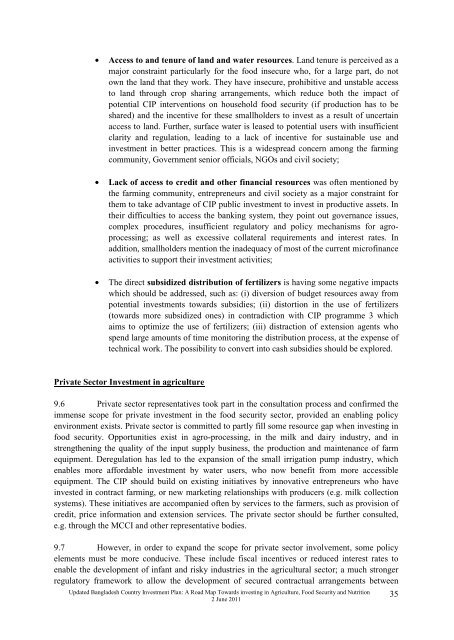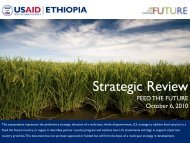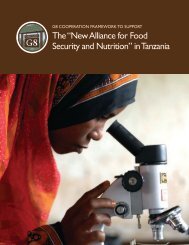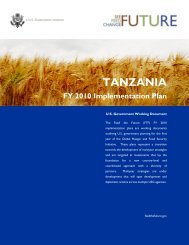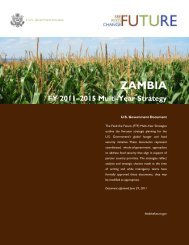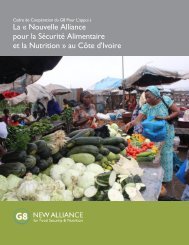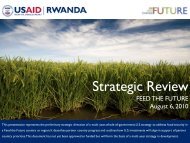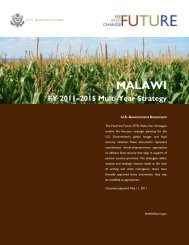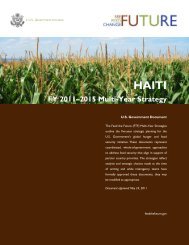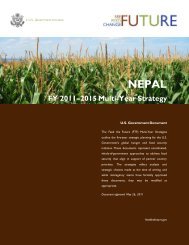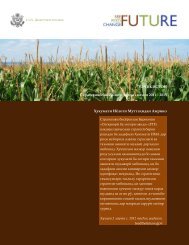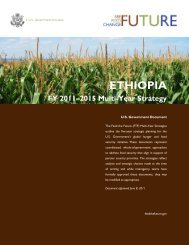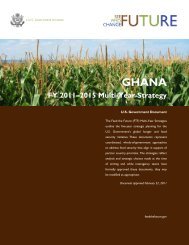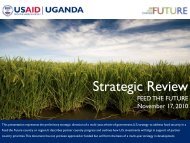Bangladesh Country Investment Plan - Feed the Future
Bangladesh Country Investment Plan - Feed the Future
Bangladesh Country Investment Plan - Feed the Future
Create successful ePaper yourself
Turn your PDF publications into a flip-book with our unique Google optimized e-Paper software.
• Access to and tenure of land and water resources. Land tenure is perceived as a<br />
major constraint particularly for <strong>the</strong> food insecure who, for a large part, do not<br />
own <strong>the</strong> land that <strong>the</strong>y work. They have insecure, prohibitive and unstable access<br />
to land through crop sharing arrangements, which reduce both <strong>the</strong> impact of<br />
potential CIP interventions on household food security ( if production has to be<br />
shared) and <strong>the</strong> incentive for <strong>the</strong>se smallholders to invest as a result of uncertain<br />
access to land. Fur<strong>the</strong>r, surface water is leased to potential users with insufficient<br />
clarity and regulation, leading to a lack of incentive for sustainable use and<br />
investment in better practices. This is a widespread concern among <strong>the</strong> farming<br />
community, Government senior officials, NGOs and civil society;<br />
• Lack of access to credit and o<strong>the</strong>r financial resources was often mentioned by<br />
<strong>the</strong> farming community, entrepreneurs and civil society as a major constraint for<br />
<strong>the</strong>m to take advantage of CIP public investment to invest in productive assets. In<br />
<strong>the</strong>ir difficulties to access <strong>the</strong> banking system, <strong>the</strong>y point out governance issues,<br />
complex procedures, insufficient regulatory and policy mechanisms for agroprocessing;<br />
as well as excessive collateral requirements and interest rates. In<br />
addition, smallholders mention <strong>the</strong> inadequacy of most of <strong>the</strong> current microfinance<br />
activities to support <strong>the</strong>ir investment activities;<br />
• The direct subsidized distribution of fertilizers is having some negative impacts<br />
which should be addressed, such as: (i) diversion of budget resources away from<br />
potential investments towards subsidies; (ii) distortion in <strong>the</strong> use of fertilizers<br />
(towards more subsidized ones) in contradiction with CIP programme 3 which<br />
aims to optimize <strong>the</strong> use of fertilizers; (iii) distraction of extension agents who<br />
spend large amounts of time monitoring <strong>the</strong> distribution process, at <strong>the</strong> expense of<br />
technical work. The possibility to convert into cash subsidies should be explored.<br />
Private Sector <strong>Investment</strong> in agriculture<br />
9.6 Private sector representatives took part in <strong>the</strong> consultation process and confirmed <strong>the</strong><br />
immense scope for private investment in <strong>the</strong> food security sector, provided an enabling policy<br />
environment exists. Private sector is committed to partly fill some resource gap when investing in<br />
food security. Opportunities exist in agro-processing, in <strong>the</strong> milk and dairy industry, and in<br />
streng<strong>the</strong>ning <strong>the</strong> quality of <strong>the</strong> input supply business, <strong>the</strong> production and maintenance of farm<br />
equipment. Deregulation has led to <strong>the</strong> expansion of <strong>the</strong> small irrigation pump industry, which<br />
enables more affordable investment by water users, who now benefit from more accessible<br />
equipment. The CIP should build on existing initiatives by innovative entrepreneurs who have<br />
invested in contract farming, or new marketing relationships with producers (e.g. milk collection<br />
systems). These initiatives are accompanied often by services to <strong>the</strong> farmers, such as provision of<br />
credit, price information and extension services. The private sector should be fur<strong>the</strong>r consulted,<br />
e.g. through <strong>the</strong> MCCI and o<strong>the</strong>r representative bodies.<br />
9.7 However, in order to expand <strong>the</strong> scope for private sector involvement, some policy<br />
elements must be more conducive. These include fiscal incentives or reduced interest rates to<br />
enable <strong>the</strong> development of infant and risky industries in <strong>the</strong> agricultural sector; a much stronger<br />
regulatory framework to allow <strong>the</strong> development of secured contractual arrangements between<br />
Updated <strong>Bangladesh</strong> <strong>Country</strong> <strong>Investment</strong> <strong>Plan</strong>: A Road Map Towards investing in Agriculture, Food Security and Nutrition<br />
2 June 2011<br />
35


